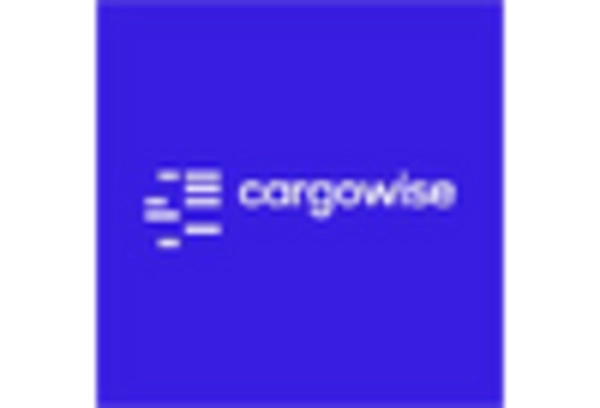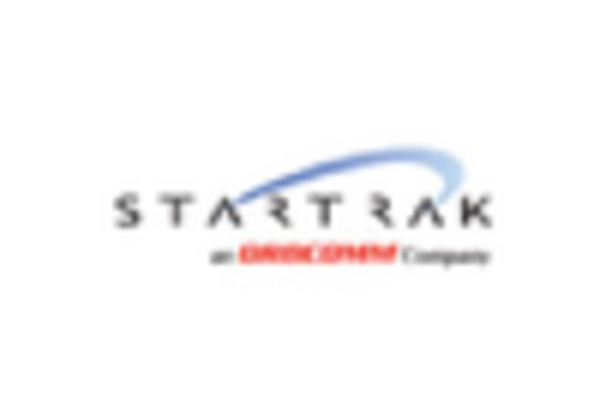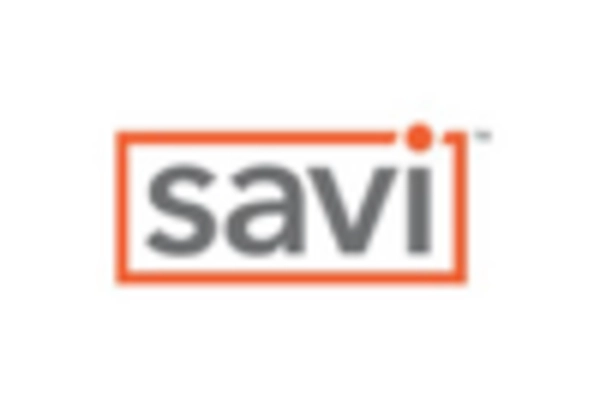Growing E-commerce Sector
The rapid expansion of the e-commerce sector is a key driver for the Electronic Cargo Tracking System Market. With the increasing volume of online transactions, logistics companies are under pressure to deliver goods promptly and efficiently. The demand for real-time tracking solutions has surged, as consumers expect transparency regarding their shipments. Recent statistics indicate that e-commerce logistics is projected to grow by over 20% annually, further fueling the need for effective cargo tracking systems. This trend suggests that as e-commerce continues to flourish, the electronic cargo tracking market will likely experience substantial growth, driven by the need for enhanced visibility and accountability.
Increasing Regulatory Requirements
The Electronic Cargo Tracking System Market is significantly influenced by the rising regulatory requirements imposed on logistics and transportation sectors. Governments worldwide are implementing stringent regulations aimed at enhancing cargo security and ensuring compliance with international trade standards. For example, regulations such as the Customs-Trade Partnership Against Terrorism (C-TPAT) mandate the use of tracking systems to monitor cargo movements. This regulatory landscape compels companies to invest in electronic cargo tracking solutions to avoid penalties and ensure compliance. As a result, the market is likely to witness accelerated growth as businesses adapt to these evolving regulatory frameworks.
Rising Demand for Supply Chain Transparency
The Electronic Cargo Tracking System Market is experiencing a notable surge in demand for enhanced supply chain transparency. Companies are increasingly recognizing the importance of real-time tracking to improve operational efficiency and customer satisfaction. According to recent data, approximately 70% of logistics firms are investing in tracking technologies to provide visibility throughout the supply chain. This trend is driven by the need to mitigate risks associated with cargo theft and loss, which can lead to significant financial losses. As businesses strive to maintain competitive advantages, the adoption of electronic cargo tracking systems is likely to become a standard practice, thereby propelling market growth.
Focus on Sustainability and Environmental Impact
The Electronic Cargo Tracking System Market is also being shaped by a growing focus on sustainability and reducing environmental impact. Companies are increasingly adopting tracking systems to optimize their logistics operations, thereby minimizing fuel consumption and carbon emissions. By utilizing electronic cargo tracking solutions, businesses can identify inefficiencies in their supply chains and implement strategies to reduce waste. Recent studies indicate that companies that adopt such technologies can achieve up to a 15% reduction in their carbon footprint. As sustainability becomes a priority for consumers and regulators alike, the demand for electronic cargo tracking systems is expected to rise, aligning with broader environmental goals.
Technological Advancements in Tracking Solutions
Technological innovations are playing a pivotal role in shaping the Electronic Cargo Tracking System Market. The integration of advanced technologies such as GPS, RFID, and blockchain is enhancing the accuracy and reliability of cargo tracking solutions. For instance, the use of RFID technology has been shown to reduce tracking errors by up to 30%, thereby improving overall logistics efficiency. Furthermore, the increasing adoption of cloud-based platforms allows for seamless data sharing and real-time updates, which are crucial for effective supply chain management. As these technologies continue to evolve, they are expected to drive further growth in the electronic cargo tracking systems market.















